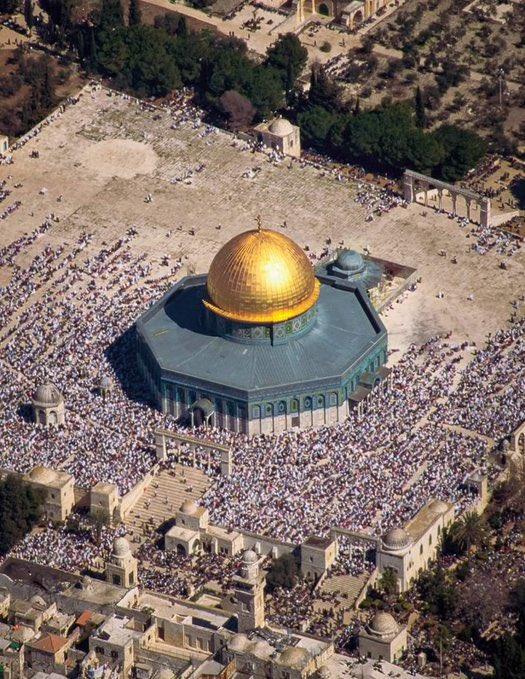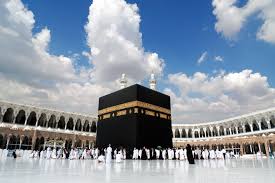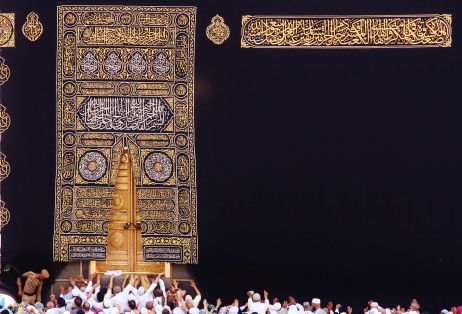Al Aqsa Reflections 1
Hafidh Farhaan Jamadar, Ramadhan 1445/2024
Having arrived in Jerusalem last night, there are a number of perspectives I could start with. From the stories of the prophets mentioned in the Qur’an, and also those in the Bible and Torah, there are a plethora of prophets who have walked on this blessed land. Ibrahim (Abraham), Musa (Moses), Isa (Jesus), Zakariyya (Zachariah), Yaqub (Jacob), Yusuf (Joseph) and the list goes on. Despite the magnanimity of these chosen men from our past, who each have their own unique story and contribution to mankind, it is the story of a woman that has me most awestruck.
She is none other than Maryam (Mary), daughter of Imran and Hanna, the only woman to be mentioned by name in the Qur’an. Today we were able to catch a glimpse into her private chamber in Al-Aqsa. Her mother Hanna had promised to offer her child to the services of the Temple when she was still expecting. The custom of the time meant that this would only have been done for a male child. Nonetheless, despite her disappointment, Hanna fulfilled her promise and sent Maryam to Al-Aqsa where it was decided that her maternal uncle Prophet Zachariah would be her custodian.
Zakariyya, who had reached old age, was the only person with a key to the chamber of Maryam. The Qur’an relates how he would be shocked by what he would often find therein. Maryam’s devotion to Allah and connection with the Almighty was unmatched. She would be blessed with sustenance, such as fruits which were out of season, which could only have been through divine ordinance.
When she was of the age of 17, she was visited by the Angel Jibreel (Gabriel), who gave her glad tidings of a son. Maryam enquired how this could be so, since she had never had relation with a man. But as Allah had provided sustenance for her without the apparent necessary means, He had also chosen a special woman to carry a special child without the need for a father.
Maryam’s shyness led her to leave Al-Aqsa for the birth of her baby, and retreat to solitude in Bethlehem. Upon her return to Al-Aqsa with her son, she was immediately targeted with the most heinous accusation for a chaste women. In response to this, Maryam was ordered to remain silent by Allah, and she simply pointed at her child. Here Isa, the boy born of a miraculous birth, was given his first miracle. A child of a mere few earthly days said ‘Indeed, I am the servant of Allah. He has given me the book and made me a messenger.’
Reflections:
1. Sometimes we plan and we think that a thing is good for us. Then, reality plays out in contrast to what we planned and we may perceive this negatively. However, just as Hanna’s disappointment at the birth of a daughter was actually the birth of probably the greatest woman who has ever lived, it may be that our disappointments are soon replaced by something which is far better than that which we had planned for ourselves.
2. As for the divine sustenance which Maryam was receiving in her chamber, Muslims believe that each iota of sustenance, whether it be food, drink, wealth, family or emotion, is allocated by Allah. Instead of worrying about things that are beyond our control, we should focus on working hard to attain that which is good for us in this life and the hereafter, alongside recognising that Allah is the sole sustainer by asking from Him alone.
3. Finally, when we are accused of that which we have not done or labelled with tags that are false or inaccurate, is it always necessary for us to respond? Especially when we know that our response will have no bearing on the opposite party, regardless of how eloquent it is or how much it is supported by evidence. Sometimes it is better for the eventual outcome to do the talking. This is why we still talk about Isa (Jesus) and Maryam (Mary) to this day, peace and salutations be upon them both.

Al-Aqsa Reflections 2
Today we had the opportunity to travel outside Jerusalem and visit areas of the West Bank such as Hebron.
My immediate thought is that the people living here are severely disadvantaged and in an extremely difficult situation compared to our brothers and sisters in Jerusalem. The people of Jerusalem benefit from the external visitors, who are able to contribute economically but also socially by contributing to an energy which includes love, solidarity and unity. On the other hand, the economic opportunities are few and far between in the West Bank. Many tourists are discouraged from visiting due to the surveillance and checkpoints. I heard stories of many Palestinian women having to give birth at the checkpoints due to the excessive and unnecessary delays at the checkpoints when trying to access hospitals.
We were invited to visit a centre facilitating for disabled people, which was a real eye opener. The smallest of blessings which Allah has bestowed us with and which we have never been grateful for, is a blessing that they they have never experienced. Further exploring the local areas in the West Bank exposed the scarceness of opportunity here. The desperate situation of the youth means that they may never be exposed to even a fractional percentage of the opportunities that we have as Muslims in the West. Their deteriorating situation over the decades, which has been implemented by design, leaves them with nothing but the pride of their homeland, resentment towards their occupier and hope in the mercy of their Lord the Almighty.
Masjid Ibrahim, the resting place of the Prophet Ibrahim (AS) is located in Hebron in the West Bank. How great must a man have been that Allah honoured him by guaranteeing that each practising person of the Ummah will send salutations upon Ibrahim (AS) and his family multiple times during every salah daily. His life of courage and determination was encapsulated by the myriad of sacrifices that he made for the sake of Allah.
Reflections:1.
Our brothers and sisters in humanity and in Islam need us, more so in the areas of Palestine that have suffered and continue to suffer the most. As Muslims we may regularly travel to our countries of origin, chase temporary luxury in places like Dubai or spend lavishly to sit on white sand beaches. The reality is that we must visit Palestine and contribute with all we have wholeheartedly.
2. We don’t know what it means to be grateful, we will probably never be in a situation which truly tests our gratitude. The smallest glimpse is when we fast between fajr and sunset and feel a little hunger or thirst, despite knowing that a banquet awaits us at iftaar. If there is anything that I would like to take away from today, it is to be grateful to Allahوان شكرتم لازيدنّكم And if you are grateful, I will give you more…
3. What made Ibrahim (AS) so great? Why is he known as khaleel-Allah, the friend of Allah? What did he do in his life to attain such a level, that even today the 3 major religions of the world are known collectively using his name? In short, he was willing to sacrifice at every turn, on the command of his Lord, even when it made zero logical sense. He went against his father and his tribe, he was thrown into a fire for angering the king and he even took a knife to sacrifice his own beloved son. To free ourselves from the shackles of mediocrity, we too must sacrifice.

Al-Aqsa Reflections 3
On the third day of reflection, I would like to take the time to focus on Al-Aqsa, the primary destination of this entire journey. It is the first qibla, the second masjid to ever be built and the third holiest site in Islam.
The first point to discuss, is what exactly constitutes Masjid Al Aqsa? Is it the dome of the rock? Is it Masjid Qibli where all salah take place? Or is it something else, maybe hidden underground? In short, the entire compound which is demarcated by the unmistakeable stone walls is Masjid Al Aqsa. According to our beloved Nabi Muhammad (SAW), there is not the area of a single hand span within Al-Aqsa except that a Prophet prayed in it or an angel stood on it. Just doing ziyarah of all the different monuments and significant landmarks within Al-Aqsa requires several days, such is its rich history and deep connection with all of the Prophets of Allah.
The people who safeguard Al-Aqsa, the Palestinian people, are a people who have truly been blessed with unique qualities by Allah. They express themselves with a warmth that is seldom found in any other corner of the Earth. Their love for Al-Aqsa is undeniable and unshakable, to even say that they would be willing to sacrifice themselves for the protection of this sacred place would be a disservice. It is much much more than that. For centuries, they have hosted travellers here from all over the world, offering a level of hospitality that is unmatched. Their energy is infectious and their deep rooted love for their homeland simply cannot be expressed in words.
One of the most unique things about Masjid Al-Aqsa, particularly in Ramadhan during the time of my visit, is the family atmosphere that buzzes throughout the Al-Aqsa compound and the city of Jerusalem. The sight of thousands of families gathering between Asar and Maghrib for iftaar is breathtaking, it demonstrates the fact that Al-Aqsa is their home more than their places of residence. Since I have been here, I have not seen or heard a single instance of gentle rebuke within the compound, let alone harsh admonishment. Every day without fail, we have been invited for iftaar by the locals. This leaves us feeling in a deficit, having taken so much when we imagined we were coming here to give.
Reflections 1.
There is no place like Masjid Al-Aqsa. This is the place where all the Prophets gathered and were led in salah by our beloved Muhammad (SAW). One who has love for Al-Aqsa will be loved in return multiple times over, and the one who disregards it is not needed by it, though he remains in need of it. It is our job to protect Al-Aqsa and when the Muslims return to the Qur’an and Sunnah, Al-Aqsa will be free.
2. Our Palestinian brothers and sisters have sacrificed everything that they have for centuries, for the love of Al-Aqsa and their homeland. You will not find a Palestinian home without a physical symbol related to Al-Aqsa. It is our duty to support them with whatever we have and benefit from the goodness and knowledge which they are so willing to give us.
3. If there is anything we can learn from our Palestinian brothers and sisters, it is to love one another as brothers and sisters in faith. If we cannot look each other in the eye and resolve petty disagreements, how could we ever stand shoulder to shoulder on the frontline to protect the borders of Islam, just as they have done and are doing to this very day.




 Zainab bint Younus, Canada
Zainab bint Younus, Canada


 I am a Muslim. I am British.
I am a Muslim. I am British.
 As Ramadhan draws to an end, in these last ten days we will see Masajid all over the UK complete their Qur’an in Taraweeh. 1000s of Qur’an will be completed all over the UK. Aside from that, most of us who do our personal reading will also complete our tilawah in our homes, along with our womenfolk and children! It’s the 23rd night tonight and a thought came to my mind. Where I come from we have forty Masajid (Blackburn), Alhumdu Lillah – 40 in such a small town. Many Masajid have 2 or even 3 Taraweeh! It can safely be said,
As Ramadhan draws to an end, in these last ten days we will see Masajid all over the UK complete their Qur’an in Taraweeh. 1000s of Qur’an will be completed all over the UK. Aside from that, most of us who do our personal reading will also complete our tilawah in our homes, along with our womenfolk and children! It’s the 23rd night tonight and a thought came to my mind. Where I come from we have forty Masajid (Blackburn), Alhumdu Lillah – 40 in such a small town. Many Masajid have 2 or even 3 Taraweeh! It can safely be said,